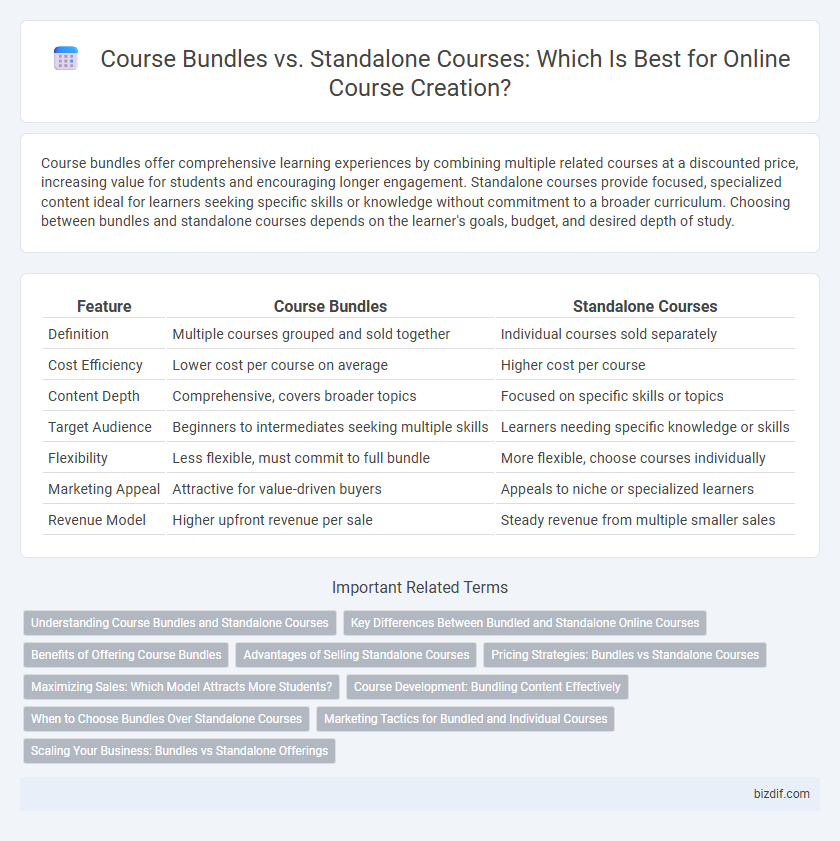Course bundles offer comprehensive learning experiences by combining multiple related courses at a discounted price, increasing value for students and encouraging longer engagement. Standalone courses provide focused, specialized content ideal for learners seeking specific skills or knowledge without commitment to a broader curriculum. Choosing between bundles and standalone courses depends on the learner's goals, budget, and desired depth of study.
Table of Comparison
| Feature | Course Bundles | Standalone Courses |
|---|---|---|
| Definition | Multiple courses grouped and sold together | Individual courses sold separately |
| Cost Efficiency | Lower cost per course on average | Higher cost per course |
| Content Depth | Comprehensive, covers broader topics | Focused on specific skills or topics |
| Target Audience | Beginners to intermediates seeking multiple skills | Learners needing specific knowledge or skills |
| Flexibility | Less flexible, must commit to full bundle | More flexible, choose courses individually |
| Marketing Appeal | Attractive for value-driven buyers | Appeals to niche or specialized learners |
| Revenue Model | Higher upfront revenue per sale | Steady revenue from multiple smaller sales |
Understanding Course Bundles and Standalone Courses
Course bundles combine multiple related courses into a single package, offering comprehensive learning paths and often providing better value compared to standalone courses. Standalone courses focus on specific topics, allowing learners to target individual skills or knowledge areas without committing to broader content. Choosing between bundles and standalone options depends on learning goals, budget, and desired depth of study in online course creation.
Key Differences Between Bundled and Standalone Online Courses
Course bundles offer multiple related courses packaged together, providing comprehensive content and better value compared to standalone courses, which focus on a single subject. Bundles often include cross-linked materials and progressive learning paths, enhancing user engagement and retention, while standalone courses deliver focused expertise ideal for targeted skill acquisition. Pricing strategies also differ, as bundles typically provide discounted rates per course, attracting learners seeking broad knowledge, whereas standalone courses cater to individuals aiming for specific, immediate learning goals.
Benefits of Offering Course Bundles
Course bundles increase perceived value by combining multiple related courses, encouraging higher enrollment rates and boosting overall revenue. Bundles offer learners a comprehensive learning path, enhancing knowledge retention and satisfaction. Packaging courses together reduces marketing costs per unit and creates opportunities for upselling and customer loyalty.
Advantages of Selling Standalone Courses
Selling standalone courses allows educators to target specific skills or topics, providing learners with focused, manageable content tailored to their immediate needs. This approach enhances flexibility for students who can select and purchase only the courses relevant to their goals, avoiding the commitment required by bundles. Standalone courses also enable quicker content updates and easier marketing strategies by highlighting unique selling points of each individual course.
Pricing Strategies: Bundles vs Standalone Courses
Course bundles often leverage value-based pricing by offering multiple related courses at a discounted rate, encouraging higher overall sales and customer commitment. Standalone courses typically use competitive pricing to attract learners seeking specific skills without a larger investment. Pricing strategies for bundles can increase lifetime customer value, while standalone courses emphasize accessibility and lower upfront costs.
Maximizing Sales: Which Model Attracts More Students?
Course bundles offer a higher perceived value by combining multiple related courses, encouraging students to invest in comprehensive learning experiences and increasing overall sales volume. Standalone courses appeal to learners seeking targeted knowledge or specific skills, often resulting in quicker purchase decisions but lower total transaction value. Maximizing sales depends on niche demand and marketing strategy, with bundles excelling in cross-selling opportunities while standalone courses benefit from focused promotion and easier consumption.
Course Development: Bundling Content Effectively
Course bundles streamline content delivery by grouping related modules, enhancing learner engagement through comprehensive topic coverage and cohesive progression. Organizing material into bundles allows instructors to repurpose content efficiently, optimizing development time while catering to diverse learner needs. Standalone courses require distinct design efforts for each subject, whereas bundles leverage interconnected lessons, boosting value and retention rates.
When to Choose Bundles Over Standalone Courses
Choose course bundles when offering complementary topics that enhance comprehensive learning and increase perceived value for students. Bundles often boost enrollment by providing cost savings and variety, ideal for topics with progressive skill levels or interconnected themes. Standalone courses work best for highly specialized skills or when targeting learners interested in specific, focused content rather than a broad curriculum.
Marketing Tactics for Bundled and Individual Courses
Course bundles offer a strategic advantage by increasing perceived value and boosting average cart size through complementary content that appeals to niche markets, facilitating cross-selling opportunities. Standalone courses demand targeted marketing tactics emphasizing unique selling points and specific learner outcomes to attract precise audience segments. Leveraging email campaigns and social media ads tailored to the course format maximizes engagement and conversion rates for both bundles and individual offerings.
Scaling Your Business: Bundles vs Standalone Offerings
Course bundles provide a scalable approach by combining multiple related topics, increasing perceived value and encouraging higher purchase rates. Standalone courses appeal to learners seeking specific skills, offering flexibility but potentially limiting overall revenue growth. Prioritizing bundles can streamline marketing efforts and boost client lifetime value, making them a strategic choice for sustainable business expansion in online education.
Course bundles vs Standalone courses Infographic

 bizdif.com
bizdif.com